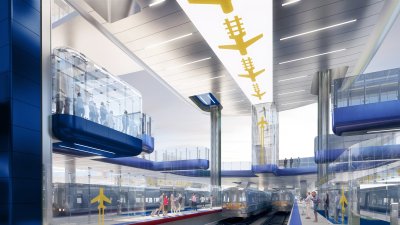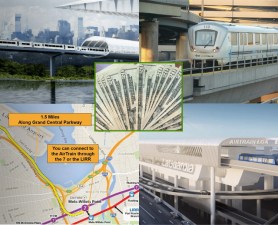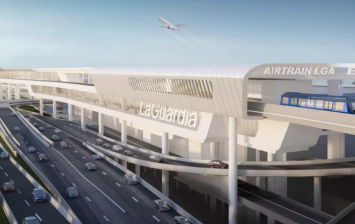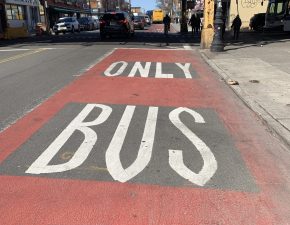BREAKING: Riverkeeper, Others Sue To Stop the LaGuardia AirTrain
Local opponents of a little-loved project ask for its approval to be 'set aside.'
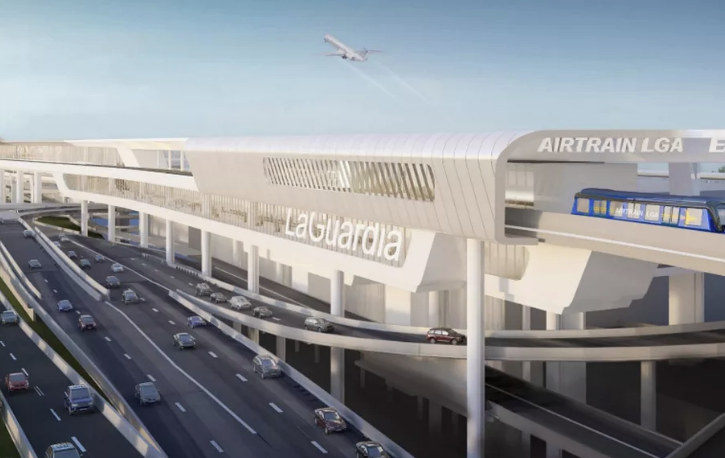
The LaGuardia AirTrain must be halted because it is an “arbitrary and captious” and illegal “abuse” of power, according to a new lawsuit filed in federal court by opponents of the controversial, bloated and unneeded proposed 1.5-mile people mover between the airfield and Willets Point.
The suit by Riverkeeper, Guardians of Flushing Bay, and Ditmars Boulevard Block Association asks the U.S. Court of Appeals for the Second Circuit to “set aside” the Federal Aviation Administration’s July 20 final approval of the Port Authority of New York and New Jersey’s $2.05-billion project, calling it “arbitrary and capricious, an abuse of discretion, and contrary to law.” Preliminary construction of AirTrain facilities was to have started this summer.
The suit alleges that the FAA violated provisions of the National Environmental Policy Act by summarily eliminating from its Environmental Impact Statement feasible transit alternatives such as an extension of the N/W subway line from Astoria to the airfield or dedicated bus service. It also challenges the use of waterfront parkland for the AirTrain’s route, charging that amounts to discrimination against an”environmental justice community” — the neighboring, historically Black community of East Elmhurst.
Riverkeeper also sent a letter today to the FAA asking it to stay the project. Per federal rules, the agency has 40 days to produce documents responding to that petition. After that process, Riverkeeper could file with the court for a stay, it said. The wrangling could delay the project, even if the suit is not successful.
The so-called Backwards AirTrain route would travel along the Grand Central Parkway and along the Malcolm X Promenade of Flushing Bay at Flushing Meadows Corona Park; an act of the Assembly in 2015 condemned the parkland for the Port Authority on behalf of the project, whose chief sponsor was then-Gov. Cuomo.

The project, whose cost more than quadrupled from $500 million at its inception in 2015, early on gained a variety of foes. Some critics complained that its “backwards” route wouldn’t save people time, because it sends Manhattan-bound travelers further east from LaGuardia — and to the 7 train and a Long Island Rail Road spur line that does not connect with the Jamaica hub — before doubling back. Transit advocates pointed out that it’s a mistake to spend so much on a project that adds so little to the city’s transportation network. The editorial boards of the Daily News and the New York Post, which seldom agree, faulted its costs. A recent report alleged that the project, long labeled a boondoggle, amounted to the most expensive such endeavor on the planet.
Transit analyst Ben Kabak, whose coverage of the AirTrain at his blog Second Ave Sagas rallied resistance to the project, applauded the suit and said that he hoped it “leads to a reassessment of better and more useful one-seat rides to Laguardia Airport.” He cautioned that such suits often are used to hamper worthy transit projects.
“I do not generally support the use of environmental-review laws to slow down or stop transit projects, but in this instance, it’s clear that the FAA in conjunction with the Port Authority and former Gov. Cuomo manipulated the EIS process to produce a desired political outcome,” he added.
Riverkeeper, for its part, complained about the potential damage to the waterfront; it uncovered documents that seemed to indicate that the Port Authority was not being forthright about its plans for development and parking near the AirTrain’s proposed Willets Point/Citi Field station. (The Port Authority denied the contentions.) Recently, some renegade Port Authority employees penned an open letter calling for an Inspector General review of the project’s approval, upon which they claimed Cuomo exerted “undue influence.”
Riverkeeper says that FAA’s decision, and what it described as the chintzy package the Port Authority is proposing to ameliorate conditions at the park, “shortchanges” the community.
“People have a right to enjoy the waterfront,” said Mike Dulong, the senior attorney for Riverkeeper, said in a statement. “The laws that were violated are there to ensure that communities and the environment are not harmed by decisions without a careful consideration of alternatives, and, if none are found, mitigation of unavoidable negative impacts. The failure to adhere to the process is an injustice that shifts the burdens of this major infrastructure project onto East Elmhurst while dismissing alternatives that might better serve New York City and impose less harm locally.”
The Port Authority pushed back forcefully.
“The Biden Administration’s transportation experts greenlighted the badly overdue LaGuardia AirTrain after reviewing more than 25,000 pages of studies and other materials, and analyzing more than 40 alternatives,” spokesman Tom Topousis said in a statement. “We are confident that the panel of federal judges who will now independently review this matter will affirm that the AirTrain is now ready to be built. This green infrastructure project will give travelers a reliable rail mass transit link to the airport; dramatically reduce greenhouse-gas emissions by getting millions of cars off the road; greatly ease traffic congestion throughout Queens; create 3,000 good-paying construction jobs and more than $500 million in opportunities for minority- and women-owned businesses; and provide $50 million of historic new funding for local parks, all without taking any private property or going through any neighborhood.”
Lawsuits involving a sham environmental process are not uncommon. In New York City, opponents of the 14th Street busway, the Central Park West bike lane, a bus lane on Fresh Pond Road, a busway in Flushing and others have argued that governments have overstepped their authority to make changes to the streetscape — authority that judges in all of the aforementioned cases have affirmed.
Nonetheless, it is very likely that the federal government will be sued after the MTA completes its exhaustive, 16-month, 28-county review of congestion pricing.
